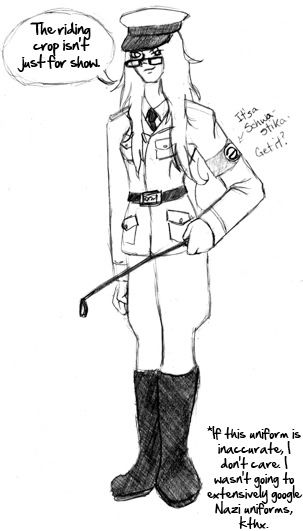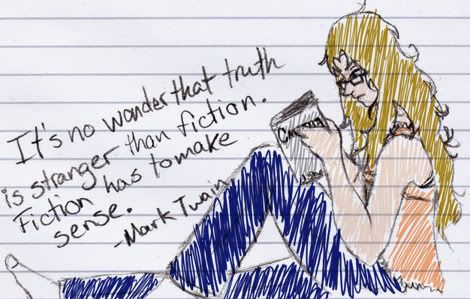|
|
Post by Prudence on Aug 16, 2009 23:55:40 GMT -5
Gather round kiddies! It's time for... PRUDENCE THE GRAMMAR NAZI'S MANDATORY ENGLISH LESSONS!
 Lesson One: SPELL CHECK AND YOU: Microsoft deserves our praise just for inventing MS Word. It can't be said enough: Spell check is your best friend, if you're not a Grammar Nazi like Prudence. Some browsers, such as Firefox, have a rudimentary spell check system built in automatically. Many forums, such as the one you're reading right now, have the option to check your spelling right before you post. These are incredibly basic, however, so you can't rely on them alone. The granddaddy of all spell checks, of course, is Microsoft Word's Spelling and Grammar check, which will not only tell you if you spelled something wrong, but also if your grammar might be a bit dodgy. It picks up sentence fragments (also known as incomplete sentences), which are a common pitfall in more dramatically written paragraphs. It also picks up on more obscure things, such as passive voice (i.e., "The ball was thrown" rather than "She threw the ball") and possible tense troubles. However, copy-pasting your posts into Word first will not polish them up automatically. After all, the spell check is just a robot. You are a real person. Often times, the spell check robot might want to correct something that isn't actually wrong. For example, colorful names (Such as "Alucard") often get that little red wiggly line of keyboardsmash, and it doesn't seem to account for dialogue when checking grammar. Many of the things it wants to correct for in standard writing are perfectly acceptable in spoken language. For instance, people use sentence fragments in conversation all the time. "At the movies" is not an acceptable sentence in narration, but it IS a perfectly acceptable spoken answer to a spoken question. Fragments CAN be okay in narration if one is going for a particular effect, but it should really only be attempted by professionals. If you're not sure whether or not you're a professional, err toward the "not" side. Similarly, passive voice is not always wrong, but it draws attention to the object of the sentence rather than the subject. As an example, in that "ball was thrown"/"She threw the ball" example I used earlier, the passive-voiced "ball was thrown" example is just fine if you're drawing attention to the ball, rather than the thrower. Again, though, this is subjective and somewhat advanced. Just keep in mind that what the Word robot thinks is your intent is not always what you actually intended. Beyond that, spell check also often misses commonly-confused homophones and ridiculously easy typos. Which brings us to... |
|
|
|
Post by Prudence on Aug 16, 2009 23:56:02 GMT -5
Lesson Two: COMMON ERRORS: That's not what "you're" means.
Let's hear it for homophones! For those of you who don't have the memory for fancy-sounding words that Grammar Nazi Prudence does, homophones are words that sound the same. There are easy, almost-never confused ones, such as "weigh" and "way," and then there are...less easy ones. For your benefit, I will not only go over the more commonly confused ones here, but also provide handy mnemonics to help prevent further confusion! (Mnemonics, by the way, are those little mental devices one might use to remember things, such as PEMDAS or "Please Excuse My Dear Aunt Sally" for the mathematical order of operations.)
They're: Contraction for "they are." This one's easy enough to remember; just replace the A in "are" with an apostrophe and you have the right word. This should never be confused with...
There: Indicates location. This one, again, is easy to remember. It's "where" with a T instead of a W. "Where? There."
Their: Indicates possesion by a group. This one is a bit more complex; it's got the word "they" in it, but it's not spelled right. Tread lightly with this one and "they're."
You're: Contraction for "you are." Same basic idea as "they're." Easy stuff.
Your: Indicates possession by you. This is easier to remember than the first three homophones, because it boils down to a simple dichotomy: Can your usage be expanded to "you are" without being rendered incomprehensible? Then use "you're." If it can't? Then use "your."
Where: In or at what place, part, or point. This is really not commonly forgotten, but occasionally confused with these next few...
Wear: to have on the body or person. One wears clothes.
Ware: Object being sold. One can wear wares, but one can't really "ware" anything, at least not in modern language.
We're: Remember "they're" and "you're"? Same thing, but with we. To extend the silly usage, We're wearing wares right now. Unless you're naked, I suppose.
Were: Does not actually sound anything like the last four examples. Is pronounced as "whirr," and is a past tense usage of the verb "to be." If it IS pronounced like "wear," then either someone forgot an apostrophe, or it's an archaic word meaning "human male" or "man," which is seen today in the word "werewolf" and almost nowhere else. (Fun fact: "man" used to be a gender neutral word, with "woman" indicating a female and "wereman" indicating a male. This usage means that, technically, female werewolves should be called wowolves. However, this looks stupid and is hard to say, so no one uses it.)
effect: The result or consequence, or the act of bringing one about. Something with an effect is effective, which is really only a useful mnemonic if you keep in mind that there's no such word as "affective."
affect: Either an emotion, or to produce an effect. This one's a bit harder to keep straight, due to the relationship between the two words, so it's much more excusable to make this mistake.
two: The number between one and three.
too: Also. Easily remembered by noting that "too" has another "o," too.
to: Barely even a word; more of a magical preposition machine with a million uses. Basically, if it's not referring to a number or can't be swapped with "also," "to" is the spelling you want.
Those are all I can think of right now, but rest assured that if I think of more, I'll add them at a later date. Also, feel free to PM or IM me about any usage you're iffy on. If I don't know, then the Great Gazoogle will. Don't worry, I don't bite unless asked very nicely and possibly bribed. Of course, all the knowledge of usage in the world won't indemnify you against our third item on the curriculum....
|
|
|
|
Post by Prudence on Aug 16, 2009 23:56:32 GMT -5
Lesson Three: TYPOGRAPHICAL ERRORS: Whoever decided that the R key and the F key should be so close together is a bad, bad person.
This is a short lesson! Hooray! What happens when your fingers slip? Worry not! Grammar Nazi Prudence may be an excellent speller, but her typing skills leave a lot to be desired, as the amount of times the "backspace" key was used in typing this up will attest to. If you follow lesson one, glorious beautiful spell check will take care of the most egregious errors you might miss, but sometimes, when you spell one word wrong, you spell another word right. Common among these are "form" and "from," "is" and "it," and "or" and "of." Really, the only thing you can do in cases such as these is make sure to check your spelling over yourself, even after using spell check. Even then, you might miss some issues, but at that point, it's a completely excusable mistake. Everyone makes them, even Grammar Nazi Prudence. If you manage to catch it before someone else posts in the thread, there's always that magical little "Modify" button in the corner. If you don't, well, no one will hold it against you. All we ask is that you put in that effort. If you don't, then we'll hold it against you. And now, with no segue at all, Lesson Four!
|
|
|
|
Post by Prudence on Aug 16, 2009 23:57:03 GMT -5
Lesson Four: PUNCTUATION: Incorrect use of ellipses causes rectal cancer. I'm not going to insult your intelligence by going over the basics. I'm fairly sure we all know where periods, exclamation points, and question marks go. Instead, I'm going to review the trickier usages of those keys on the keyboard that may elude some people. Let's start with the Oxford comma. This is a cause of some consternation in academic circles, so don't worry too much about this. The "Oxford comma"(also known as the serial comma or the Harvard comma) refers to how commas are used when listing things. For example, "Beg, borrow, and steal," as it's written there, uses the Oxford comma. It's the comma just before the word "and." Some people like to use it, some people don't. However, it helps to know that there are some circumstances where it's confusing to use the Oxford comma, and there are also circumstances when it's awkward not to use it. The Wikipedia article on it provides much better examples than I can. Exclamation points should be used once at the end of an exclamatory sentence. Twice is acceptable if you really want to emphasize extreme loudness or ferocity. No more than two should ever be used seriously by anyone without a death wish. This goes for question marks as well. For a shouted question, I prefer the use of the interrobang, but as there's no key on the standard keyboard for that, I'm fine with a single conjunction of both exclamation and question marks, such as "!?" or "?!" depending on which is more emphasized: The "shouting" aspect or the "question" aspect, respectively. This effect should definitely be used sparingly, if at all. A commonly used and abused form of punctuation on the internet today is the ellipsis (plural form "ellipses"), or as it's commonly known, "dot dot dot." I am a great fan of ellipses, as you may have noticed from the six times I've used them in this lesson alone! They're wonderful for indicating uncomfortable pauses, dialogue trailing off, a sense of mystery, and loads of other things. However, when used incorrectly, they quite infuriate Grammar Nazi Prudence, and that's very bad. I will now lay down the law on them. One: An ellipsis is THREE PERIODS. No more, no less, except in one case which I'll get to in a moment. MS Word even truncates triple periods as one piece of punctuation; this is because they are/it is. Adding more periods does not indicate a longer pause. It indicates a writer who does not know how ellipses work. The only exception to this is if you are ending a sentence with an ellipsis. Ellipses are not sentence-ending punctuation. Thus, you'd need to use four periods instead of three to indicate trailing off. In dialogue, you may need to use a comma after the ellipsis at some point. More on this in a moment. Other than this, ellipses can go almost anywhere in a sentence where the writer requires the kind of pause that a comma won't provide. Now, quotation marks are another surprisingly tricky issue. Not the quotations themselves; people seem to have those more or less down, but how other punctuation marks interact with them. If you are having a character quote someone in their speech, the proper way to indicate this is to put apostrophes (which handily double as single quotations) where you'd put the quotations if it weren't in speech. Example: "I told him, 'We're going to the movies.'" If you're indicating who said the sentence directly after they say it, you end the sentence in a comma. The period after the indication acts as the period for the sentence the character said. Bad example: "We're going to the movies." she said. <--This is wrong. Don't do that. Good example: "We're going to the movies," she said. If you want to indicate who's speaking in the middle of their sentence, you must use a comma to reintroduce the speech, and leave off the capital letter after the quotations. Example: "We're going to the movies," she said, "unless we can't get a ride." As a final note on quotations: Commas and periods are always on the inside of quotation marks when they're next to each other. A good mnemonic for this is to think of periods and commas as being too little to be left out alone. (Cute, right?) Now for the intimidating punctuation: Semicolons. I am madly, madly in love with semicolons; they're unbelievably useful and I plan to use them as much as possible in this paragraph so you can get a better feeling for where they're used. They look obscure and difficult at first, but they're really not. Once you get a handle on them, there ceases to be a question of why they belong where they belong; they just do. In the most basic terms: Semicolons go where a period might cause grammatically incorrect or very choppy sentences, but a comma would cause a run-on. If you have two seperate but not-entirely-distinct thoughts, a semicolon goes between them. I can't really articulate the rules of usage any better than that; they're drilled into my head too well. Instead, I'll link you once again to the Wikipedia article about them. |
|
|
|
Post by Prudence on Aug 16, 2009 23:57:29 GMT -5
I think that about wraps it up, but I'm keeping some posts open for editing, just in case more lessons are needed at a later time. In the mean time, testimonials! That's right, we've found the one issue they can all agree on. |
|
|
|
Post by Prudence on Aug 16, 2009 23:57:49 GMT -5
reserved
|
|
|
|
Post by Prudence on Aug 16, 2009 23:58:17 GMT -5
reserved
|
|
|
|
Post by Sir_Integral on Aug 17, 2009 0:51:03 GMT -5
I'm pretty sure Prudence in Nazi attire made this day worth living.
|
|
|
|
Post by Duria Hellsing on Aug 17, 2009 1:35:23 GMT -5
I read the whole thing! Is it bad that I actually enjoyed it? o.o;;
I loved the pictures too. :3
Oh yeah! That's another thing to address; the use of the word "to".
|
|
|
|
Post by Prudence on Aug 17, 2009 1:37:11 GMT -5
Awesome semicolon usage. I cannot believe I forgot "to."
I'm glad you liked it! Fun lessons stick better than boring ones.
|
|
|
|
Post by judasxkiss on Aug 17, 2009 20:03:38 GMT -5
Enrico also sayeth Prudence earns a gold star!
|
|
|
|
Post by Pip on Aug 17, 2009 22:22:27 GMT -5
This makes my vacation 100% more enjoyable ....
|
|








